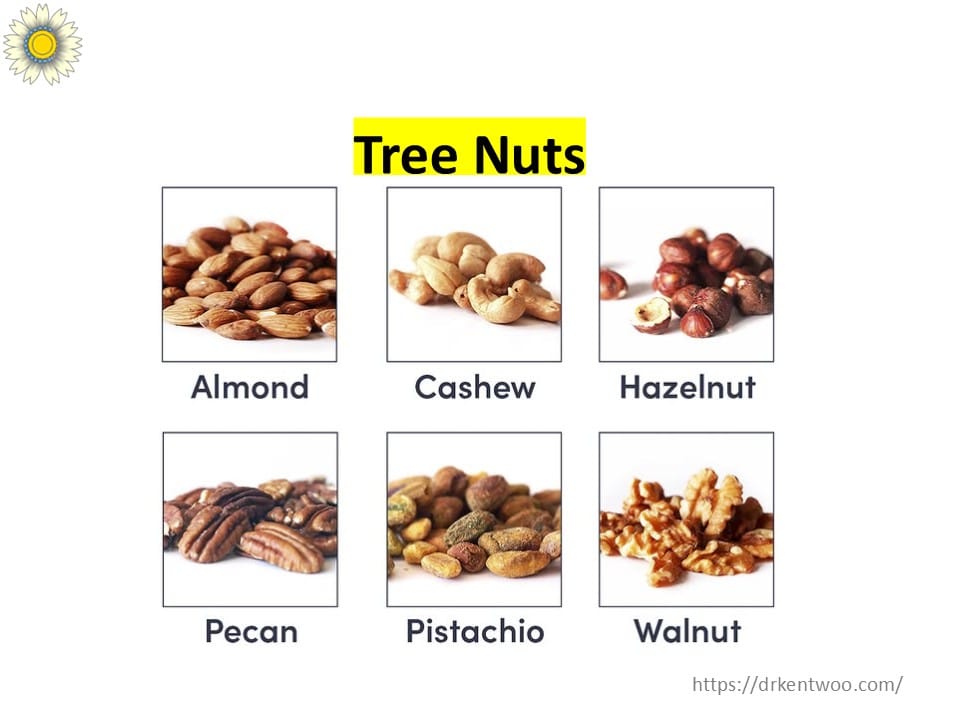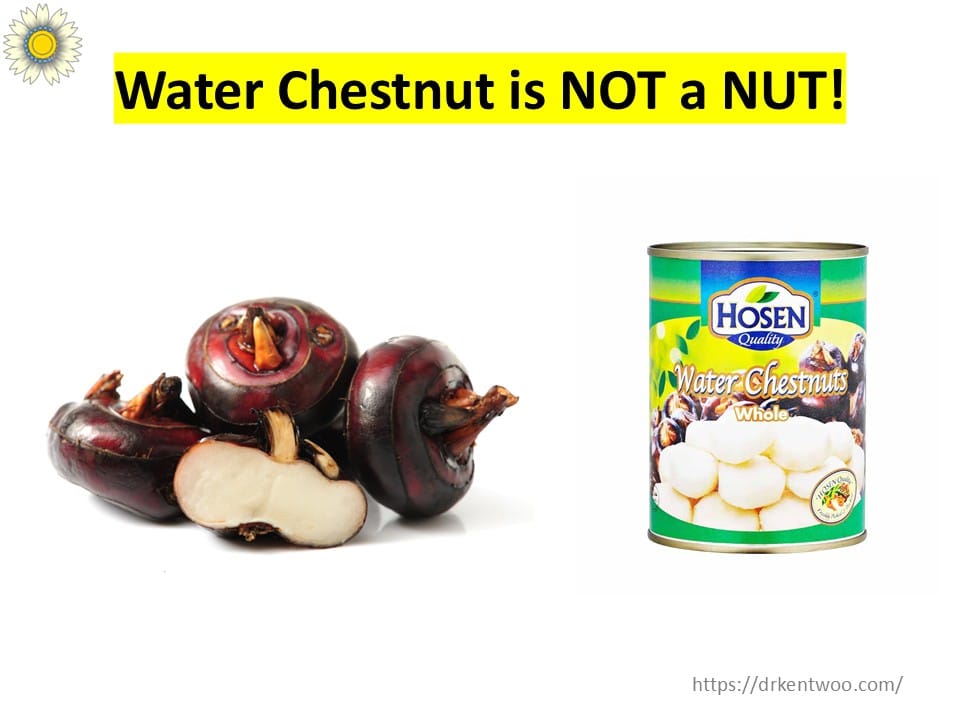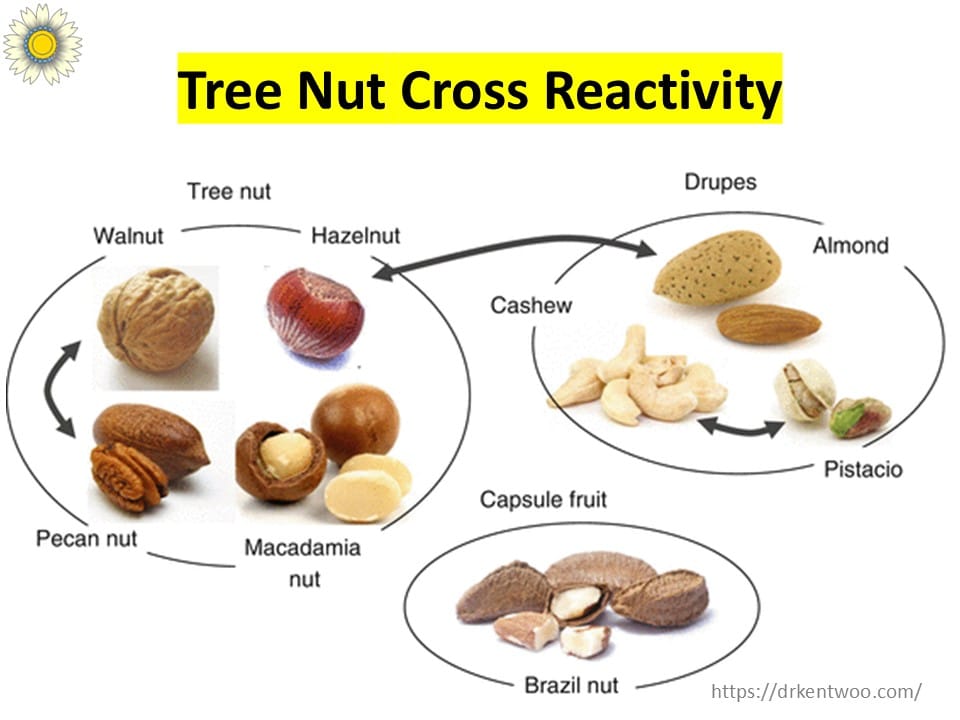Tree Nut Allergy: What to Avoid and Cross-Reactivity Information

Tree nut allergies are among the most common and persistent food allergies, often lasting a lifetime. Even small amounts of tree nut proteins can trigger reactions ranging from mild symptoms like itching and hives to severe anaphylaxis. Individuals with a tree nut allergy should be cautious, as nuts can be present in unexpected foods, and cross-contamination is common in food processing.
Tree Nuts to Avoid
If you have a tree nut allergy, you should avoid consuming the following nuts and any products that contain them:
- Almond
- Beechnut
- Brazil nut
- Bush nut
- Cashew
- Anacardium nuts
- Chestnut
- Coconut
- Hazelnut (Filbert)
- Nutella® (contains hazelnuts)
- Ginkgo nut
- Hickory nut
- Lichee nut / Lychee nut
- Macadamia nut / Macadamia nut butter
- Nangai nut
- Pecan
- Pralines
- Pine nut (Indian, piñon, pinyon, pigndi, pigñolia, pignon nuts)
- Pistachio
- Shea nut
- Walnut
- Butter nut
- Japanese walnut
- Heartnut
- Natural nut extract (e.g., almond extract)
- Nougat
- Nu-Nuts®
- Nut butters (e.g., cashew butter and other nut butters)
- Nut meal
- Nutmeat
- Nut milks (e.g., almond milk, cashew milk)
- Nut oils (e.g., walnut oil, hazelnut oil, macadamia oil)
- Nut paste
- Nut pieces
May Contain Tree Nuts
Some food ingredients and additives may contain tree nuts or be processed in facilities that handle tree nuts, leading to cross-contact. These include:
- Natural flavoring
- Artificial flavoring
Should Be Safe

The following are not botanically related to tree nuts and are generally considered safe for individuals with tree nut allergies. However, always check with an allergist if unsure:
- Water chestnut (a type of aquatic vegetable, not a nut)
Tree Nut Cross-Reactivity: What You Need to Know

Certain tree nuts are closely related and share similar proteins, which increases the likelihood of cross-reactivity. If allergic to one, you may also react to the other.
- Cashew and Pistachio: These nuts belong to the same botanical family (Anacardiaceae) and have a high rate of cross-reactivity. People allergic to cashews often react to pistachios as well.
- Walnut and Pecan: These belong to the Juglandaceae family and share allergenic proteins, making cross-reactivity common.
- Almond and Hazelnut: While they come from different families, studies suggest some people allergic to one may also react to the other due to similar protein structures.
- Brazil Nut and Walnut: Though not from the same family, they have been shown to cross-react in some cases.
If you have a tree nut allergy, your allergist may recommend avoiding all tree nuts due to the risk of cross-contamination in processing facilities, even if you’re not allergic to every type of tree nut.
Hidden Sources of Tree Nuts
Tree nuts can sometimes be found in unexpected foods, so always check ingredient labels carefully. Potential hidden sources include:
- Baked goods (cakes, cookies, pastries)
- Chocolates and candies
- Nut-based spreads and pastes (e.g., marzipan, gianduja)
- Ice creams and frozen desserts
- Pesto (may contain pine nuts)
- Salad dressings and sauces
- Protein bars and granola bars
- Breakfast cereals and granola
- Some alcoholic beverages (e.g., amaretto, certain flavored liqueurs)
Managing a Tree Nut Allergy
- Read labels carefully: Look for allergen warnings such as “may contain tree nuts” or “processed in a facility that also processes tree nuts.”
- Be cautious when eating out: Always inform restaurant staff about your allergy and ask about cross-contamination risks.
- Carry epinephrine (EpiPen): If you have a history of severe reactions, always carry an epinephrine auto-injector.
- Consult an Allergist/Immunologist: If unsure about cross-reactivity, an allergist can conduct specific tests to determine which nuts you may safely eat.
FAQ: Tree Nut Allergy
1. Can I eat coconut if I have a tree nut allergy?
Coconut is botanically classified as a fruit, not a nut. Most people with tree nut allergies can safely eat coconut, but some individuals may still react to it. Consult an allergist if unsure.
2. Can I eat nutmeg if I have a tree nut allergy?
Yes. Nutmeg is a spice derived from seeds, not tree nuts, so it is safe for people with tree nut allergies.
3. If I’m allergic to one tree nut, do I have to avoid all of them?
Not necessarily, but due to the risk of cross-contact in food processing and potential cross-reactivity, many allergists recommend avoiding all tree nuts unless allergy testing confirms specific safety.
4. Are nut oils safe for people with tree nut allergies?
Cold-pressed or unrefined nut oils (e.g., walnut oil) may still contain allergenic proteins and should be avoided. Highly refined nut oils may have fewer proteins, but their safety is not guaranteed. Always check with an allergist before consuming.
5. How can I prevent accidental exposure to tree nuts?
- Always check ingredient labels.
- Inform restaurant staff about your allergy.
- Avoid buffets and bulk bins, where cross-contact is common.
- Educate family and friends about your allergy to help prevent accidental exposure.
Tree nut allergies require constant vigilance, but with proper precautions, you can stay safe while managing your diet effectively. Always consult an Allergist/Immunologist for personalized advice and testing.
The Allergy Immunology Clinic is here to help you with your food allergy.




